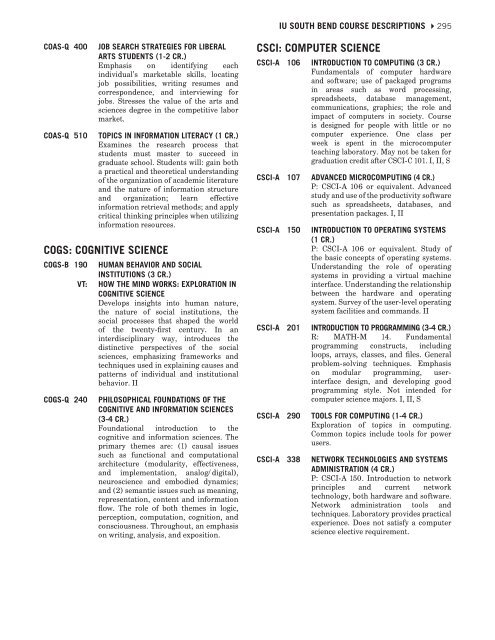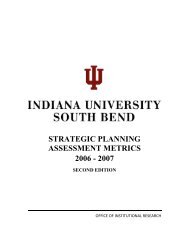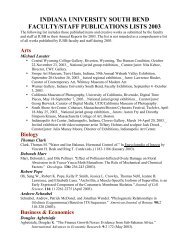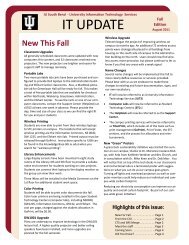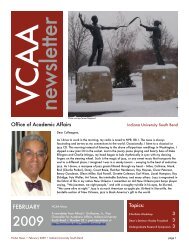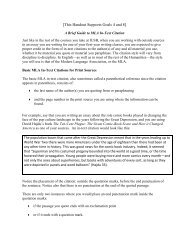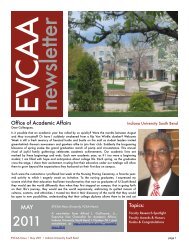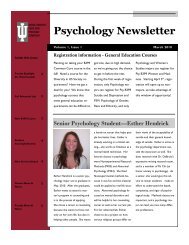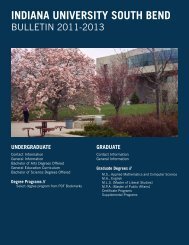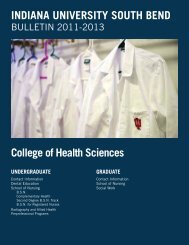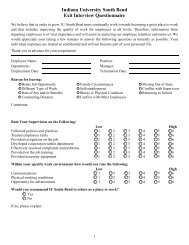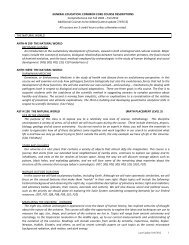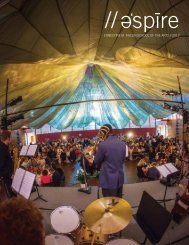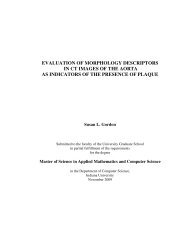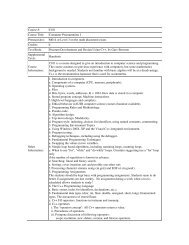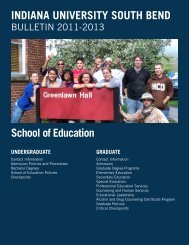INDIANA UNIVERSITY SOUTH BEND Course Descriptions
INDIANA UNIVERSITY SOUTH BEND Course Descriptions
INDIANA UNIVERSITY SOUTH BEND Course Descriptions
Create successful ePaper yourself
Turn your PDF publications into a flip-book with our unique Google optimized e-Paper software.
IU <strong>SOUTH</strong> <strong>BEND</strong> COURSE DESCRIPTIONS 4295<br />
COAS-Q 400<br />
COAS-Q 510<br />
JOB SEARCH STRATEGIES FOR LIBERAL<br />
ARTS STUDENTS (1-2 CR.)<br />
Emphasis on identifying each<br />
individual’s marketable skills, locating<br />
job possibilities, writing resumes and<br />
correspondence, and interviewing for<br />
jobs. Stresses the value of the arts and<br />
sciences degree in the competitive labor<br />
market.<br />
TOPICS IN INFORMATION LITERACY (1 CR.)<br />
Examines the research process that<br />
students must master to succeed in<br />
graduate school. Students will: gain both<br />
a practical and theoretical understanding<br />
of the organization of academic literature<br />
and the nature of information structure<br />
and organization; learn effective<br />
information retrieval methods; and apply<br />
critical thinking principles when utilizing<br />
information resources.<br />
COGS: COGNITIVE SCIENCE<br />
COGS-B 190<br />
VT:<br />
COGS-Q 240<br />
HUMAN BEHAVIOR AND SOCIAL<br />
INSTITUTIONS (3 CR.)<br />
HOW THE MIND WORKS: EXPLORATION IN<br />
COGNITIVE SCIENCE<br />
Develops insights into human nature,<br />
the nature of social institutions, the<br />
social processes that shaped the world<br />
of the twenty-first century. In an<br />
interdisciplinary way, introduces the<br />
distinctive perspectives of the social<br />
sciences, emphasizing frameworks and<br />
techniques used in explaining causes and<br />
patterns of individual and institutional<br />
behavior. II<br />
PHILOSOPHICAL FOUNDATIONS OF THE<br />
COGNITIVE AND INFORMATION SCIENCES<br />
(3-4 CR.)<br />
Foundational introduction to the<br />
cognitive and information sciences. The<br />
primary themes are: (1) causal issues<br />
such as functional and computational<br />
architecture (modularity, effectiveness,<br />
and implementation, analog/digital),<br />
neuroscience and embodied dynamics;<br />
and (2) semantic issues such as meaning,<br />
representation, content and information<br />
flow. The role of both themes in logic,<br />
perception, computation, cognition, and<br />
consciousness. Throughout, an emphasis<br />
on writing, analysis, and exposition.<br />
CSCI: COMPUTER SCIENCE<br />
CSCI-A 106<br />
CSCI-A 107<br />
CSCI-A 150<br />
CSCI-A 201<br />
CSCI-A 290<br />
CSCI-A 338<br />
INTRODUCTION TO COMPUTING (3 CR.)<br />
Fundamentals of computer hardware<br />
and software; use of packaged programs<br />
in areas such as word processing,<br />
spreadsheets, database management,<br />
communications, graphics; the role and<br />
impact of computers in society. <strong>Course</strong><br />
is designed for people with little or no<br />
computer experience. One class per<br />
week is spent in the microcomputer<br />
teaching laboratory. May not be taken for<br />
graduation credit after CSCI-C 101. I, II, S<br />
ADVANCED MICROCOMPUTING (4 CR.)<br />
P: CSCI-A 106 or equivalent. Advanced<br />
study and use of the productivity software<br />
such as spreadsheets, databases, and<br />
presentation packages. I, II<br />
INTRODUCTION TO OPERATING SYSTEMS<br />
(1 CR.)<br />
P: CSCI-A 106 or equivalent. Study of<br />
the basic concepts of operating systems.<br />
Understanding the role of operating<br />
systems in providing a virtual machine<br />
interface. Understanding the relationship<br />
between the hardware and operating<br />
system. Survey of the user-level operating<br />
system facilities and commands. II<br />
INTRODUCTION TO PROGRAMMING (3-4 CR.)<br />
R: MATH-M 14. Fundamental<br />
programming constructs, including<br />
loops, arrays, classes, and files. General<br />
problem-solving techniques. Emphasis<br />
on modular programming, userinterface<br />
design, and developing good<br />
programming style. Not intended for<br />
computer science majors. I, II, S<br />
TOOLS FOR COMPUTING (1-4 CR.)<br />
Exploration of topics in computing.<br />
Common topics include tools for power<br />
users.<br />
NETWORK TECHNOLOGIES AND SYSTEMS<br />
ADMINISTRATION (4 CR.)<br />
P: CSCI-A 150. Introduction to network<br />
principles and current network<br />
technology, both hardware and software.<br />
Network administration tools and<br />
techniques. Laboratory provides practical<br />
experience. Does not satisfy a computer<br />
science elective requirement.


